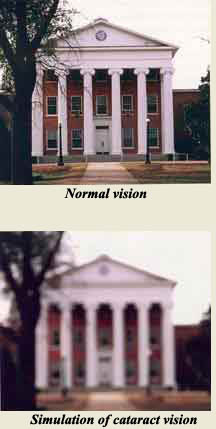Cataract Surgery | Cataract Surgery – What to Expect | LASIK/Refractive Surgery | YAG Laser
Ophthalmic Plastic/Reconstructive Eye Surgery | Glaucoma Surgery | General Ophthalmology
Cataract Surgery
Our doctors perform over 3,000 cataract and implant surgeries a year.


What is a Cataract?
A cataract is a clouding of the normally clear lens of the eye. The clouding is usually the result of aging but some very young patients develop cataracts for unknown reasons. Injuries, certain diseases, and some medications may cause cataracts.
Cataracts prevent light from passing through the lens to the retina, the light sensitive lining in the back of the eye. Much like the lens of a camera focuses light on the film, the lens of your eye focuses light on the retina. If your camera lens becomes dirty or fogged, then the picture taken will be hazy or blurred. A cataract causes the light focused on the retina of your eye to be blurred in the same manner.
Cataract Symptoms
You may notice problems with your vision at any time during the formation of a cataract. Generally, there is a dimming, or blurring of vision as a cataract develops. This is sometimes first noticed because of difficulty in driving, particularly at night, or difficulty in reading small print or sewing. A glare or halo may appear to surround familiar objects exposed to bright light. Many people feel as though a film is covering the eye. However, a cataract is not a growth or film on the outside to the eye, but a clouding within the lens inside the eye, so surgery is required to remove the cataract.
Once cataracts are removed, you are again able to enjoy many of life's simple pleasures, such as freedom of travel, reading, or the joy of witnessing a grandchild smile.
Cataract Treatment
Once a cataract has been diagnosed, it is up to you to decide how it affects your life and when you should have the cataracts removed. The best guideline is to take action when the cataract starts interfering with your work or normal activities.
There are no medications or diets that will prevent cataracts. Catarct development varies from person to person. Only YOU can decide when your eyesight needs improvement. Because it is possible to exchange your cloudy lens for a clear implant, the decision of when you are ready rests with you. However, there are times when surgery is vital for the health of the eye. Fortunately, most of the time, a cataract does not endanger the overall health of the eye.
 We use a procedure called "no stitch" surgery to treat cataracts. A process called phacomulsification is used to break the cataract apart with ultrasonic vibrations. The cataract is then removed through a tiny microscopic incision. Next a slender "narrow profile" intraocular lens is implanted through the same tiny opening. The intraocular lens replaces the eye's natural lens which had clouded and become a cataract. After the lens is in place, the tiny incision is closed without using any stitches. The entire procedure takes less than 30 minutes to perform and is done on an outpatient basis.
We use a procedure called "no stitch" surgery to treat cataracts. A process called phacomulsification is used to break the cataract apart with ultrasonic vibrations. The cataract is then removed through a tiny microscopic incision. Next a slender "narrow profile" intraocular lens is implanted through the same tiny opening. The intraocular lens replaces the eye's natural lens which had clouded and become a cataract. After the lens is in place, the tiny incision is closed without using any stitches. The entire procedure takes less than 30 minutes to perform and is done on an outpatient basis.
Cataract Surgery – What to Expect
What To Expect:
Most patients can expect improved vision after surgery. The single specialty Surgery Center offers a relaxed environment for your surgery.
Preprocedure:
A full eye exam is performed to determine if the surgery will benefit the patient. Patients may eat at their normal times. All tests and surgeries are performed on site. PLEASE BRING ALL CURRENT MEDICATIONS TO OUR OFFICE.
Postprocedure:
Drops are used for differing times after surgery. Your eyelids will be numb and not function well after surgery. Normal functioning will return within 3-5 hours after surgery. You may use your eyes as much as you wish after surgery, there are no bandages. You can resume most normal activities one to two days after surgery.
RETURN TO TOP
LASIK/Refractive Surgery

LASIK surgery is a safe alternative to contacts and glasses. A brief laser treatment can reduce your dependence on glasses or contacts. Our LASIK doctors have performed thousands of LASIK surgeries. While no specific outcome can be guaranteed, 99% of our LASIK patients see 20/40 or better after surgery. We utilize the most advanced technology including No Blade Z-Lasik and Wavefront analysis to carefully mold your cornea to the desired shape.
If you are tired of your dependence on glasses or contacts, call Rayner Eye Clinic at 1 (800) 237-3430 to set up a free LASIK screening to determine if you are a candidate for this safe and effective refractive surgery.
YAG Laser
Eye surgeons frequently use the YAG laser to clear cloudy membranes, which can occur months or years after a cataract is removed. The YAG laser makes it possible to restore good vision by opening the membranes rapidly, without pain and without hospitalization.
Ophthalmic Plastic/Reconstructive Eye Surgery
Ophthalmic plastic and reconstructive surgery addresses problems affecting the eyelids, the tear system, the orbit, and adjacent face. These problems can arise as a result of aging changes, birth defects, trauma, tumors, or generalized disease such as thyroid disease. Depending on the reason for your problem, surgery may be described as either cosmetic or reconstructive.
The most common procedures performed by ophthalmic plastic surgeons are eyelid deformities (entropion, ectropion), baggy eyelids (dermatochalasis), scars, trauma, droopy eyelids (ptosis), eyelid cancer (malignancy), loss of an eye (anophthalmos), thyroid disease, birth defects (congenital), and tearduct problems.
Dr. Tann specializes in Ophthalmic Plastic and Reconstructive Surgery. These procedures are available and routinely performed at Rayner Eye Clinic, LLC.
Glaucoma Surgery
Dr. Zoghby specializes in glaucoma management, treatment and surgery. Surgery involves either laser treatment or making a cut in the eye to reduce the intraocular pressure. The type of surgery he recommends will depend on the type and severity of your glaucoma and the general health of your eye. Glaucoma surgery can help lower pressure when medication is not sufficient, however, it cannot reverse vision loss.
General Ophthalmology
Comprehensive Ophthalmology
Adult and Pediatric Eye Care
Glaucoma Management and Treatment
Diabetic Management and Treatment
RETURN TO TOP








